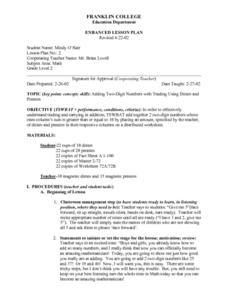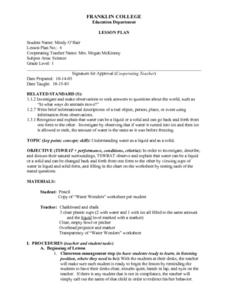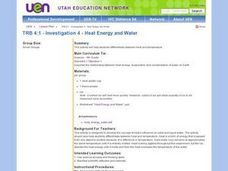Curated OER
Are Fruits And Vegetables Really Made of Cells?
Students design and carry out an exercise to determine if a given fruit or vegetable is composed of cells. They dissect out sections of the fruit or vegetable, prepare stained slides, and make observations under a compound microscope.
Curated OER
Edible Cells
Eighth graders construct edible models of a plant cell and an animal cell and state the functions of the organelles. They are to write a short sentence describing the function of each organelle.
Curated OER
Civil Rights and the Michigan Supreme Court II
Students view a PowerPoint presentation on the Michigan Supreme Court Historical Society's Civil Rights and/or the Native American Rights. They write a reaction paper and prepare for a class discussion. They work in groups and discuss...
Curated OER
Power and Authority
Fourth graders study authority and power as its used in government. In this government lesson, 4th graders define power and authority. Students then read different scenarios of authority and power examples in people as well as...
Curated OER
An American Legacy-Lewis and Clark’s Corps of Discovery Study
Fifth graders travel with the Corps of Discovery. In this ancient civilizations lesson, 5th graders research print and Internet sources about the Lewis and Clark expedition. Students prepare PowerPoint presentations to share their...
Curated OER
Heritage: Petroglyphs and the Stories They Tell
Fourth graders are introduced to the use of petroglyphs as a form of communication by the Native American tribes of the region that is now Utah. They prepare their own original picture stories and then switch with a partner to translate...
Curated OER
Adding Two Digit Numbers with Using Dimes and Pennies
Second graders participate in a math game using dimes and pennies. They practice combining coins to make a given amount of money, and they use the combinations to practice adding two digit numbers. Teacher assessment strategies and...
Curated OER
Water - Solid and Liquid
First graders conduct a science inquiry by comparing water in its liquid and solid form. The students describe the different stages of water and complete a worksheet answering questions about each form of the water. Teacher assessment...
Curated OER
Heat Energy and Water
Fourth graders brainstorm the differences between heat and temperature. In groups, they determine the best way to melt ice without touching the ice. They record their observations and compare them with other groups. To end the lesson...
Curated OER
Frankenstein - Frankenfolio
Students engage in a variety of activities in order to appreciate the literature of Frankenstein. They create a portfolio that tracks progress towards mastering skills and stated objectives.
Curated OER
U.S. History: The Great Depression
Seventh graders examine the Great Depression and federal relief programs such as the Civilian Conservation Corps. Focusing on Texas, they assess the effects on poor farmers and discuss what they would do for a living had they lived in...
Curated OER
Breakfast for Champions
Students prepare an event to honor philanthropic activities in their community. In this common good lesson, students send out invitations to local non-profits or to those who engage in philanthropic activities and plan an awards...
Curated OER
I AM a Researcher, "I"nca, "A"ztec, "M"aya
Students create and original multimedia presentation on the Incas, Mayans, or Aztecs. In this Meso-American civilization lesson, students research and then compare and contrast the civilizations of the Incas, Mayan and the Aztecs....
Curated OER
Writing Multiple Viewpoints Using Sequoyah
Fifth graders practice using quotation marks and capitalization in writing. In this multiple viewpoints lesson, 5th graders read Sequoyah and write ten sentences stating what they believe the character was thinking. Students write...
Curated OER
Discover the Real Depression
Eleventh graders take a closer look at living conditions during the Great Depression. In this Great Depression lesson, 11th graders analyze primary source packets that their teachers prepare and then record facts about life...
Curated OER
Importance of Fresh Vegetables and Fruits in Our Diets
Students explore the importance of fruits and vegetables in our diets. In this science lesson, students discuss various types of fruits and vegetables. Students play the good health=good diet game. Students discuss types of fruits and...
Curated OER
Character and Citizenship Education
Students analyze the importance of being a socially healthy citizen. In this character education lesson, students brainstorm personal traits that they think make the world a better place. Students compile their ideas as a class to...
Teach-nology
Author's Purpose
Challenge your class to find the three purposes for writing. After they read three short passages, kids note whether the author's purpose was to inform, persuade, or entertain.
Curated OER
Lewis and Clark for Grades PreK-2
Students read the "The Journey Begins" article and discuss why people want to discover new lands and why it is still exciting today. They are introduced to the idea that Lewis and Clark sent back discoveries to President Thomas...
Curated OER
Perform Accounting Functions
Learners practice performing various accounting functions. Given analysis records, they prepare cost and revenue analysis based on specific criteria. They complete handouts and review their answers as a class. They also discuss the...
Curated OER
Bringing the U.S. into World War II
Students research and explore the cause and effects of global warfare. They assess the concept of the United States policy of isolationism as it involves the United States and Japanese relations. Each group of students prepare a time...
Curated OER
Manage Soil
Young scholars identify and classify soil ypes according to data on the soil triangle. Given examples, students identify soil conservation practices, using criterion assessment instrument. When giving a case situation involving soil...
Curated OER
U.S. History Knowledge Test 3
In this U.S. history trivia worksheet, students answer twenty multiple choice questions based on their knowledge of U.S. history. This is an interactive worksheet.
Curated OER
Myth-Conceptions
Young scholars examine the myths and misconceptions surrounding early European colonists in the New World. They analyze images, artwork, and media relating to the early colonists and discuss their accuracy.























